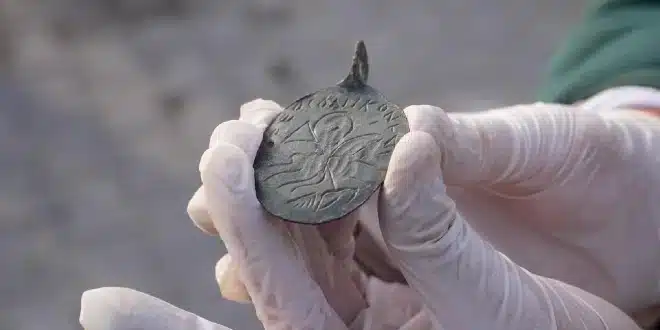Archaeologists in Turkey have made a remarkable discovery of a rare fifth-century Christian pendant. The pendant, depicting King Solomon on horseback slaying the devil, is unique to the region of Anatolia, which encompasses much of modern-day Turkey.
The bronze pendant features inscriptions in ancient Greek on both sides. One side, showing King Solomon, reads “Our Lord defeated evil,” while the reverse lists the names of four angels: Azrael, Gabriel, Michael, and Israfil.
Ersin Çelikbaş, an archaeologist at Karabuk University in Turkey, explained to Live Science that the pendant symbolizes both religion and power. People likely used it as an amulet for protection against danger or evil.
King Solomon, mentioned in the Hebrew Bible as the ruler of ancient Israel in the 10th century B.C., is a significant figure in Christianity, Judaism, and Islam. However, archaeological evidence supporting the biblical account of Solomon is limited. Çelikbaş noted that the pendant is distinctly Christian, highlighting Solomon’s importance across the three major religions. He emphasized the artifact’s significance for Anatolian archaeology due to its depiction of Solomon.
The pendant was discovered during excavations at Hadrianopolis, an ancient city previously known as Uskudama, which was inhabited by the Thracians before being rebuilt by Roman Emperor Hadrian around A.D. 124. Today, the city is known as Edirne.
Found in a building likely associated with military activity, Çelikbaş mentioned that earlier excavations had revealed the presence of a cavalry unit in the area. Solomon, known as the commander of armies, was apparently regarded as a protective figure for the Roman and Byzantine cavalry in Hadrianopolis. Çelikbaş suggested that the pendant probably belonged to a cavalry soldier.
He also noted that a similar artifact was found in Jerusalem, indicating the widespread religious significance of Hadrianopolis in ancient times. This discovery further underscores the city’s importance as a religious center during that era.


